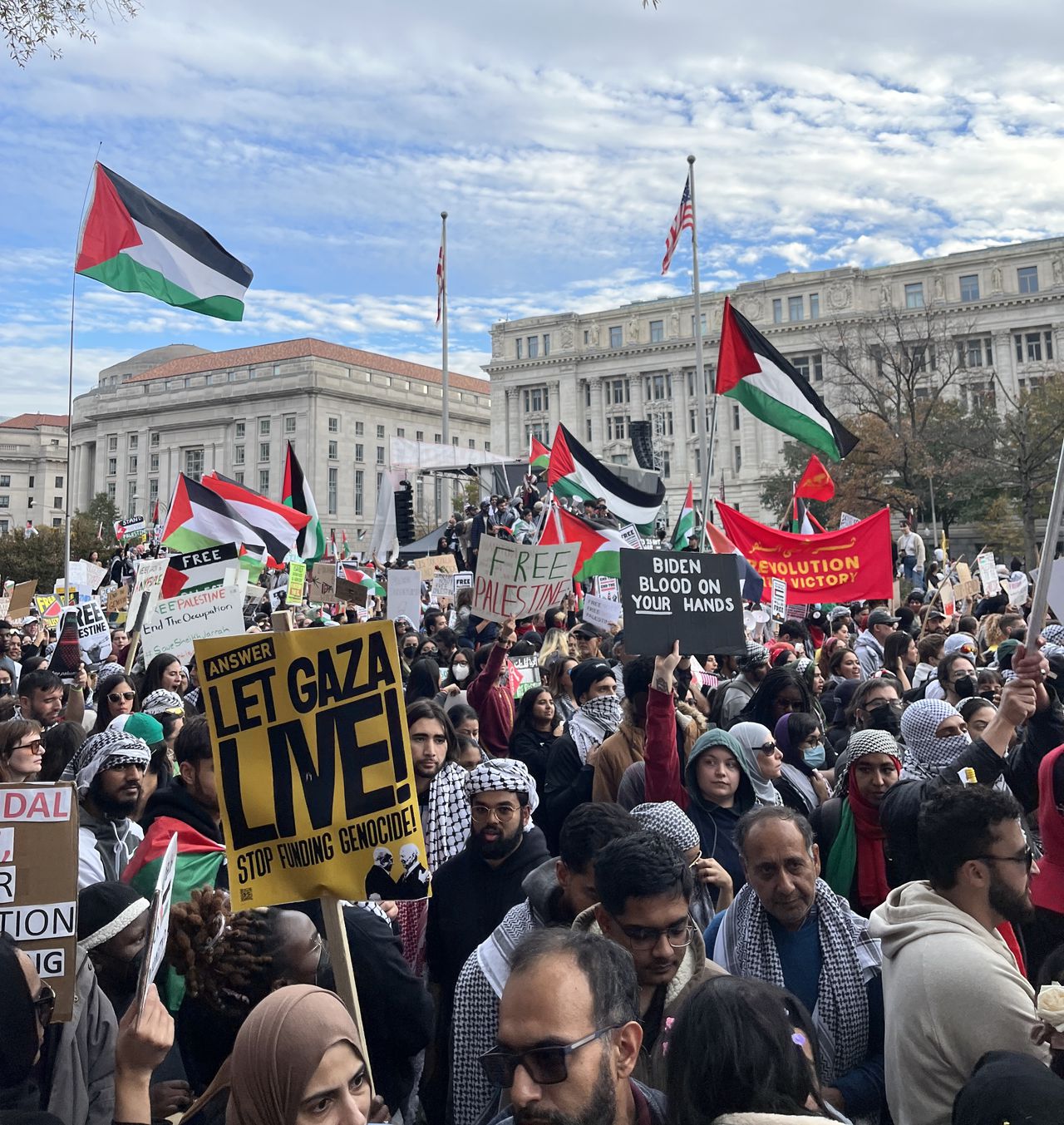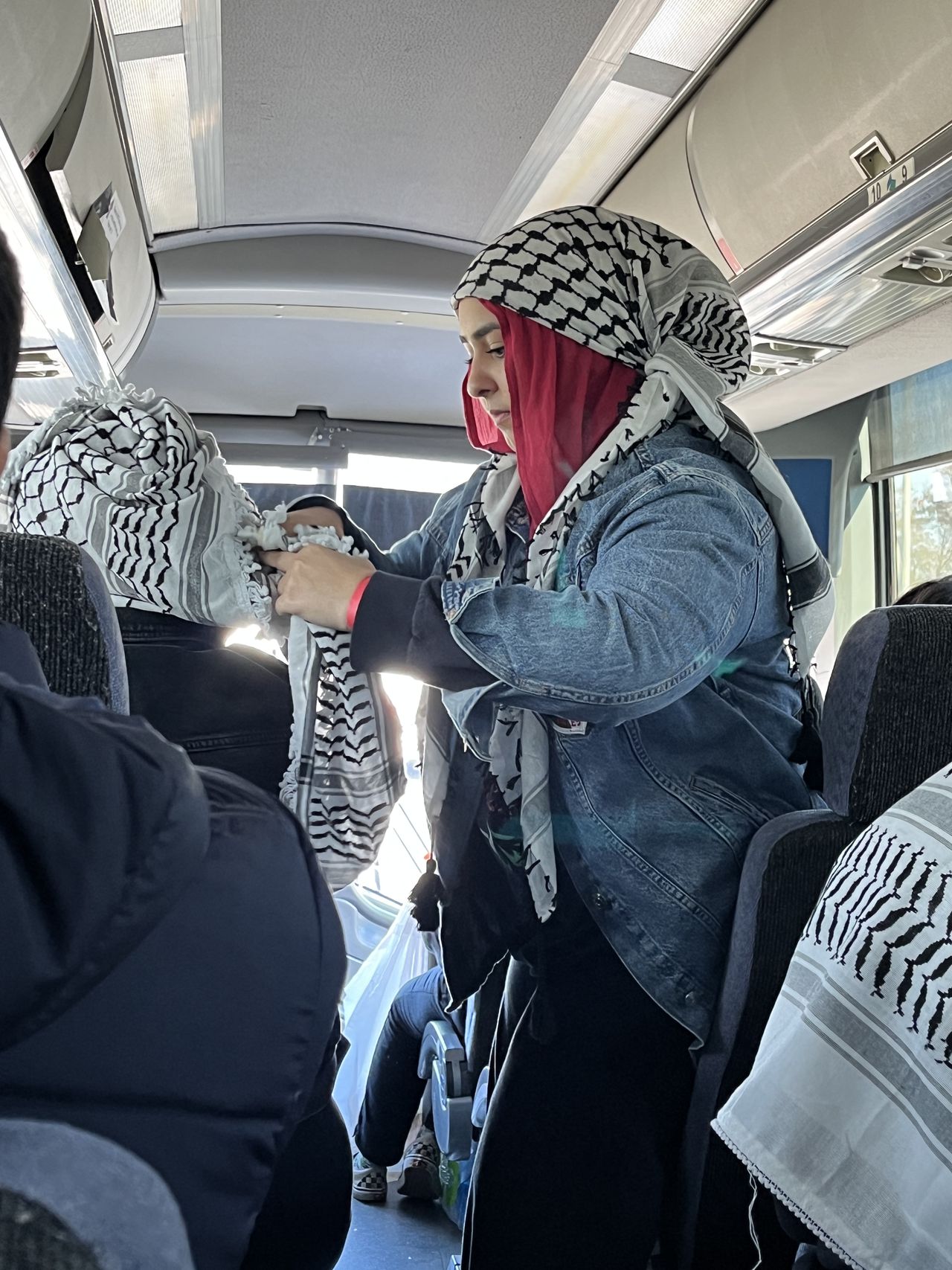What itâs like to travel from Raleigh to D.C. to march for Palestine
Eliya Sider smoothes and twists a keffiyeh over her friend’s head before taking her seat on a bus bound for Washington, D.C. Sider and some 650 others departed from the Islamic Association of Raleigh Masjid (IAR) in Raleigh, North Carolina at dawn for Saturday’s National March on Washington for Palestine.
Family and friends surrounded Sider on the bus, heads also adorned with keffiyeh. The black and white scarf, a symbol of national identity and resistance for Palestinian people, bears intricate patterns representing centuries-old trade routes through Palestine, including waves of the Mediterranean sea and olives, a major agricultural crop.
“I was visiting family in Palestine when the war started and saw first-hand the strength and resilience of Palestinians in such devastating times,” Sider said. “There was no question that I had to do everything in my power to incite change and being part of this protest is just a small part of that journey.”
Eliya Sider, a Palestinian student from Raleigh, North Carolina adjusts her friend’s keffiyeh at a rest stop in Carson, Virginia.Makaelah Walters / Reckon
The protest comes as the number of Palestinians killed by Israeli forces surpasses 10,000 in the wake of a month-long bombing campaign. The conflict began on Oct. 7th when Hamas killed 1,400 Israelis in an attack. Lawmakers are still mulling aid requests to Israel, though the Senate blocked a $14.3 billion package on Tuesday.
As Bus 5 rolled out of the parking lot, one of the bus captains laid out the itinerary for the day. Then, some tips for protesters: pick a buddy, someone to accompany you throughout the day; download WhatsApp to communicate with others in the group and stay up to date on changes regarding departure; wear a mask to avoid the spread of COVID.
And finally, breakfast: Bus captains handed out manakeesh, a round Middle-Eastern flatbread covered in cheese and spices.
Behind Sider, Taha Arif sat head bowed, immersed in a paperback copy of Edward Said’s Orientalism as his friend napped beside him. He brought a sign he’d painted the night before. The poster, duct taped to a wooden stick, read “Educate, Create, Liberate,” handpainted in the colors of the Palestinian flag — black, white and green.
Before Oct. 7, Arif said he knew very little about the U.S.’s relationship to countries in the Middle East, but President Joe Biden’s declaration of the nation’s unwavering support for Israel days later was a “tipping point.” He registered for a library card that week on a mission to become educated.
“It’s not that you need a college degree in Middle East studies to understand what’s going on,” he said. “But I did think to myself ‘I need to do some work’ because I want to do my part but first I’ve gotta figure out where I stand. What am I trying to do? Do I believe that voting can help and join DSA [Democratic Socialists of America]? Or, do I focus on an abolitionist perspective and get involved in defunding systems of oppression locally?” he said.
By Saturday, Arif had an idea of where he stood, so he and a friend made a last-minute decision to ride with a coalition of groups to Washington.
The journey to D.C. was part of a mass mobilization effort at the local level. The Party for Socialism and Liberation of the Carolinas (PSL), Refund Raleigh, Muslims for Social Justice and Muslim Women For crowdfunded more than $3,500 to cover expenses for renting nine buses from North Carolina to Washington and feeding passengers along the way.
Refund Raleigh is a young grassroots abolitionist group. Its mission is inextricably linked with the Palestinian struggle for freedom, Brea Perry, an organizer with the group, said. Raleigh’s police have direct ties to Israeli military forces, with millions of dollars sent to the IDF yearly and a former police chief who trained with police in Israel.
“The connection is central to our understanding of why policing is so oppressive in our city,” Perry said. “We keep having city leaders claim to care about the thriving of our communities, but the city budget never reflects that.”
On Bus 3, Perry and her co-captain take a moment to solicit answers to three questions from riders: Who are your networks? What skills do you have? What skills do you want?
“Now that we have this large database of networks and skills, we can build out larger organizing tactics with these new people that were strangers for the most part when we got on the bus,” Perry said.
Demonstrators stepped off the bus near Freedom Plaza around 2:30 and followed the voices of thousands of protesters roaring back at Macklemore, who began an impromptu speech saying, “I don’t know enough. But I know enough that this is a genocide.” The crowd blocked the view of the stage with flags and posters reading “Ceasefire now!” hoisted above their heads.

Demonstrators attend the National March on Washington.Makaelah Walters / Reckon
Parents carried children with megaphones on their shoulders, amplifying their calls for peace. Several Muslim men parted from the crowd to find a quiet corner to pray before returning to the demonstration.
Throughout the day, the crowd swelled to over 300,000 demonstrators, who later marched down Pennsylvania Avenue demanding a ceasefire in Gaza and the end to the U.S.’s military and financial aid to Israel. Protestors mounted bus shelters, scaled street lights and filled truck beds waving Palestinian flags and chanting.
Cell reception was spotty en route to 1600 Pennsylvania Ave. and some organizers split from their groups but everyone reunited before the steel gates of the White House. It was dark by then and buses were waiting to make the four and a half hour return trip to Raleigh.
Perry pondered what comes next as she turned away from the White House.
“When we get back to Raleigh or wherever our cities are, what are we prepared to do to continue putting pressure on elected officials so that they have no choice but to concede to our demands?” Perry asked. “That’s part of what it means to have power.”
